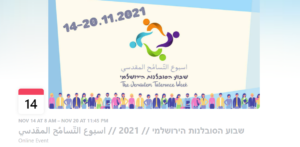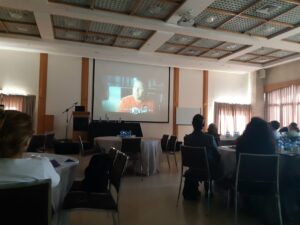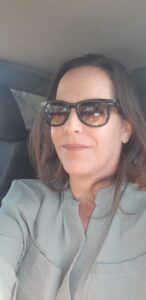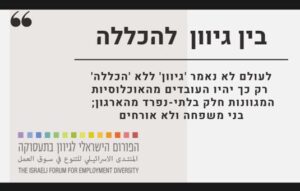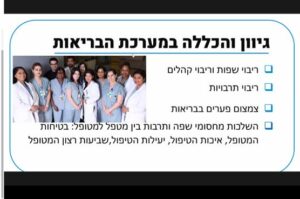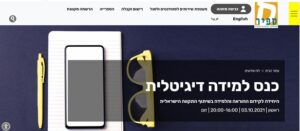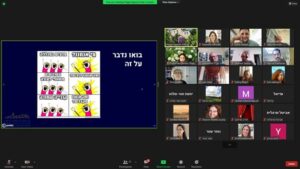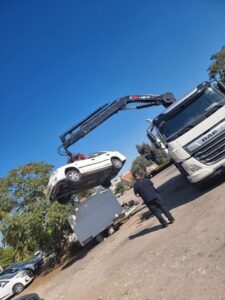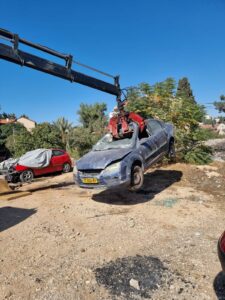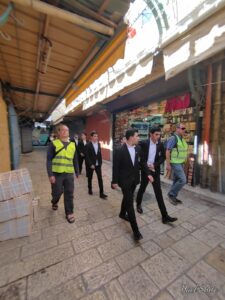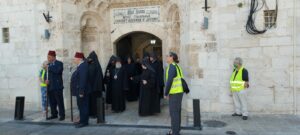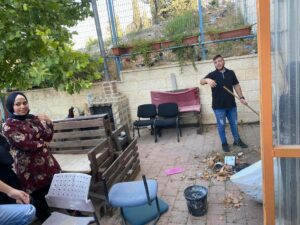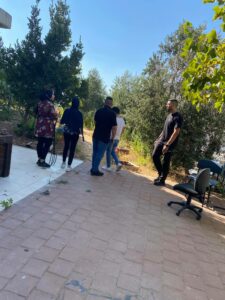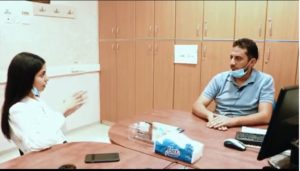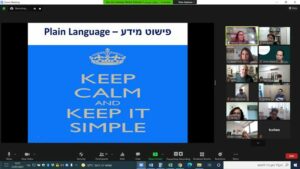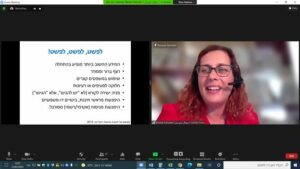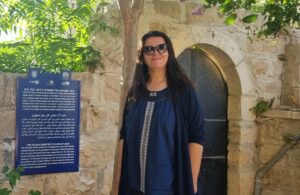Revving up for Tolerance Week
Each year, Jerusalemites take responsibility for “International Tolerance Day” (November 16) and turn it into a full week of events, activities and encounters in the public sphere that bring together Jerusalemites of all hues, backgrounds and cultures.
Only in Jerusalem – International Day becomes over a week of activist activity that promotes tolerance and multiculturalism!
This is the 6th year in a row that we’re having Tolerance Week. Here’s just a taste of what’s happening (here’s the PDF version):
Shabbat Reception with Yoga Synagogue | Laura Gilinski
Bring in the weekend with Yoga Synagogue in a stress-reducing yoga session in three languages: Hebrew, Arabic and English. The session will combine identical asanas (instructors) in different languages! Side by side we’ll practice the same poses side by side using different words – and we’ll let the body and mind do the talking. In this way we’ll show that we are all made of the same materials and driven by similar aspirations. We will end with intentions of living together and loving everyone.
Friday | 12.11 | 10:00 | Haas Promenade, East Talpiot
“Environmental Factors that Promote Tolerance and Restraint” | Lily Halperin
Impatience and the inability to delay satisfaction have many explanations. In tonight’s session Ms. Lily Halperin will introduce us to a number of environmental factors that can advance these important abilities, both within ourselves and with those around us.
Lily Halperin is the head of the Truth Center for Tolerance. Pre-register by email: Lily.Halperin@gmail.com
Sunday | 14.11 | 19:00 | Friends of Israel Museum – Rivlin 20, Nahalat Shiva
Neighborhood Tractate – Launch of a secular-Haredi bookshelf
We are honored to invite the residents of the Ramat Sharett and Jerusalem neighborhood to a festive event of the launch of a secular-Haredi bookshelf to be held on Sunday, November 14, 21 at 5:00 PM near the Kaddish Luz-Zilberg bus stop (near Kochav-Asher Gani Square). This project is the result of meetings between ultra-Orthodox and secular residents from the Ramat Sharet and Beit Vagan neighborhoods, who met for a period and discussed issues related to being neighbors.
Sunday | 14.11 | 17:00
Unique tour of the ‘Moshav Zakanim’ exhibition | The Old Yishuv Court Museum
The tour is included in the museum admission fee. Pre-registration required.
Sunday | 14.11 | 10:00
Urban tour of the African asylum seekers community in Jerusalem | JACC
For anyone who is physically in Jerusalem but mourns distant worlds – the churches, places of entertainment and secret alleys of the 3,500 refugees from Eritrea, Sudan and Ethiopia are just waiting for you to discover them. For anyone who loves new encounters and is intrigued by other cultures – this is the tour for you. Music, religion, culture, food – what else do you need? To register: https://did.li/SvZYH
Sunday | 14.11 | 17: 30-19: 00 | Mahane Yehuda Light rail station
“Complex Identities in Jerusalem” | Women’s Panel Women Wage Peace
In this diverse women’s panel we will address questions of complex identity in Jerusalem. The panelists will share personal experiences and thoughts about the common space from a female perspective in an open and intimate conversation.
Monday | 15.11 | 18:30 | FELM Center Jerusalem
Language Exchange Meeting (Hebrew-Arabic) for Women | Language Exchange Community
An open meeting of the Language Exchange women’s community. Get to know a new culture and language in a unique community. Pre-registration is required via WhatsApp (Lior – 050-376-7778). A basic level of the language being learned is required. Monday | 15.11 | 17: 30-19: 15 | Muslalla
Difficult Conversations – for Everyone. Everywhere | Mosaica
We invite you to take part in a workshop from the world of mediation and dialogue in order to successfully navigate a difficult conversation with a family member / at work / with roommates or neighbors. Pre-registration required: https://forms.gle/f92UDjKCiyCvRmye8
Monday | 15.11 | 20:00 | Rashut HaRabim House, 33 Aharon Rabinovitz St.
Meeting of Women, East & West, about Yarn and Crochet | Studio of Your Own
In an intuitively feminine and flowing conversation, spectacular surprises are woven and knitted in a connecting thread. During the summer we decorated Zion Square with an urban knitting project and now we want to add color to the public sphere in East Jerusalem. The meeting is part of an ongoing series that is attracting more and more women who meet through creating and female craft, and change the discourse and public space. Feel free to join. Pre-registration required: https://forms.gle/GMKUXFBLyB5eMyq3A.
Monday | 15.11 | 10: 00-12: 00 | Studio of Your Own – 10, 29th of November St.
Not Nice – A Solo Comedy Show | Hullegeb Theater
About woman who is trying to turn over a new leaf, and along the way berates herself, her community and the state. The show alternates between a stand-up style and an evolving show. The actress speaks honestly and humorously about the stigmas and prejudices that exist in Israeli society, alongside her personal longing for a partner.
Tuesday | 16.11 | 20:30 | The Confederation House
To purchase tickets and full details: https://did.li/hT5Hw
Tolerance and Femininity – Women’s Poetry Evening
An evening of women’s poetry reading and music on tolerance. A meeting of women from different communities and identities in Jerusalem, who come to write, to read and to sing their thoughts, opinions and beliefs about the other, about identity, and about connections. Pre-registration and pre-sending of materials required.
Tuesday | 16.11 | 20:00
Hebrew / Arabic Kosher Palestinian Cooking Master Class
Learning Arabic? Thinking about learning Arabic? Join 19 others in a German Colony family kosher kitchen for a master class in stuffing grape leaves, taught in Hebrew and beginner’s Arabic by chef extraordinaire Magdah Alshane. FREE but, since places are limited, registration is required: https://forms.gle/J6GNaqEAMNQV28MbA
Tuesday |16 November | 19.00 to 22.00
Chess4Solidarity-Tolerance Day, International Online Chess Tournament.
Tuesday |16 November | 18:00 Opening Ceremony, 18:30 first round
Facebook: https://www.facebook.com/chess4all
Premiere | C.A.T.A.M.O.N. Dance Group
A joint dance performance by two artists. Muslim and Jewish. Choreographer and dancer. Both born and raised in Jerusalem. Both are looking for the moment when everything will freeze and it will finally be possible to breathe.
Admission is free, pre-registration is required: https://forms.gle/YCGUXjFpyyxbSn5m9
Tuesday | 16.11 | 19:00 | Alliance House, 5 Kiach St.
Year-Opening Event | Blend.AR
We are excited to invite you to open a year with a Blend.AR. If you feel that the Arabic language speaks to you, come and experience practice circles tailored to different levels and hear more about our programs. The evening will be accompanied by musicians from the Abu Tor All-Stars band and a jewelry exhibition by Israeli and Turkish artists, as part of the Jerusalem Biennale events
To register: https://bit.ly/Blendar_community
Tuesday | 16.11 | 19:00 | Tower of David Museum
‘Quality of life in a diverse city’ – introductory evening and panel | Jerusalem Institute of Policy Research
On the common and different between the population groups in Jerusalem – an event that will address the different perceptions of quality of life, on the backdrop of shared living in the city. How do Jerusalemites perceive the concept of “quality of life”? Keynote Speaker: Michal Korach, Jerusalem Institute for Policy Studies. Presentation of a study: “Quality of life indices in Jerusalem – subjective examination”
Wednesday | 17.11 | 18:00 | Zoom
Second Hand Fair and Play | Zion Community and Landa Theater
In honor of Tolerance Week, you are invited to find treasures at the Blue Door – a Jerusalem boutique that connects three religions and all corners of the city. Women’s, men’s and children’s clothing, proceeds donated to needy families. You are welcome to donate clothes in excellent condition, renew your own wardrobes, and enjoy the play ‘Crowded at Home’ by the Landa Theater, in Hebrew and Arabic.
Wednesday | 17.11 | 16:30 | The Blue Door, to the right of the YMCA courtyard
Speaking Arabic-Hebrew | Language Exchange
We will meet to exchange Arabic and Hebrew with friends from all over Jerusalem. Free admission! Entry with the Green Pass or negative home Covid test on that day. Wednesday | 17.11 | 18:00 | YMCA – meeting room
“Points from My Life” | Elwyn Theater Group
We invite you to meet, listen and get to know Elwyn’s members – a short show that tells about us, our aspirations, expectations and challenges – people with disabilities, followed by an open discussion with questions from the audience.
Wednesday | 17.11 | 16:30 | The Israel Museum – the auditorium in the Youth and Art Education Division
Cross – Cultural Introductory to the Recording Arts: This project brings together Arab and Jewish at-risk youth on a common interest in the recording arts. Youth meet once a week at the JIY creativity Lab to learn and practice the art of music and DJing. If you work with at-risk groups and would like to cooperate, please contact culture@ymca.org.il.
Jerusalem International YMCA Wednesdays at 14:00
Status Quo and Tolerance | Window to Mount Zion
How did Mount Zion come to be sacred to Jews, Christians and Muslims alike? Why there? And how do rabbis, monks, artists and organizations of all religions live side by side? Is this an opportunity for world peace or a recipe for disaster? We will try to answer these questions and more among the alleyways, courtyards and holy sites on Mount Zion. Pre-registration required : https://forms.gle/nNe5C8sgkeYt1fXE9
Thursday | 18.11 | 11: 00-13: 00
Melodies Coming to Jerusalem | Shabbat reception with Ofer Golani and Shachar Sorek
We believe that music is the mother of all languages, it exists above and before all religions and its role is to connect people. You are invited to welcome the Shabbat with melodies that come from all Jerusalem communities that open the heart.
Friday | 19.11 | 12:00 | Independence Park – The Upper Amphitheater
Women on Palmach | Shabati
A tour by the Shabati project (joint use of the public space by secular and religious Jews), with Itamar Farchi, an economist and resident of Palmach St. who researched the stories of female heroes of the Palmach. During the tour he’ll tell about the lives and activities of Haviva Rake, Zohara Levitov, Netiva Ben-Yehuda and additional women – while walking through real and imaginary buildings and gardens. The tour will last 1 1/2 hours.
Saturday | 20.11 | 15:00 | Museum of Islamic Art
Trans Memorial Day | The Open House for Pride and Tolerance
Join us to commemorate the Trans Memorial Day in a special and intimate event. Screening of the movie, “Send Me an Angel” and a discussion with the movie’s creator, Shachar Arpov. Afterward a lecture about the Trans Memorial Day and victims of transphobia in Israel, by Niki Sever, a trans activist.
Saturday | 20.11 | 20:00 | Cafe Ambala, 3 Yanai St.
In the neighborhoods:
Kiryat HaYovel Shopping Center
16/11 – Mashu Mashu play: Ouzo and Mouzo from the Village of Kakarouzo | 16:00
19/11 – Backgammon Tournament | 11:00
East Talpiot
15/11 – Community Mini-Mall at the Well-Baby Center | 16:00
Pisgat Ze’ev
21/11 – Movie screening and lecture on the movie, “High Holidays,” in cooperation with the Zeevik community pub
Gonenim
21/11 – Tour of Beit Safafa | 16:15
Many thanks to the Jerusalem Foundation and Natan for their ongoing partnership in advancing tolerance in Jerusalem.

